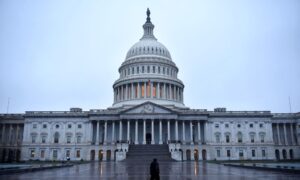
Both Congressional chambers have returned to Washington this week, following the August recess. Senate and House lawmakers have about a month to pass legislation to fund the government along with another CCP virus relief package.
The Senate is back in session Tuesday, focused on confirming judges, voting on the next CCP virus relief bill, and heading off a government shutdown with a likely continuing resolution (CR). The House is focused on committee work this week and holding floor action starting next week.
Senate Majority Leader Mitch McConnell (R-Ky.) said Monday that his priority is to pass another CCP virus relief package. Relief funding negotiations between the White House and Democratic leaders have stalled with Speaker Nancy Pelosi (D-Calif.) saying the White House must increase funding for the relief package by $1 trillion before Democrats will continue negotiations.
Senate Minority Leader Charles E. Schumer (D-N.Y.) told his Democratic colleagues in a letter Thursday said Republicans would be moving in the “wrong direction” if they were to vote on an even smaller version of their $1 trillion CCP virus relief bill.
“Their proposal appears to be completely inadequate and, by every measure, fails to meet the needs of the American people,” Schumer said.
Meanwhile, McConnell criticized Democrats for holding up the negotiations for political gain.
“Working families must not suffer more than necessary because Democrat leaders think citizens pain may help their political fortunes,” McConnell said. “Congress can, should, and must do more to help. The Senate will vote and the American people will be watching.”
Secretary of Treasury Stephen Mnuchin told a House committee last week he would not back the Democrats $2.2 trillion relief package, even with them coming down from the initial $3.4 trillion ask.
Also, this month, lawmakers are expected to pass a CR, to prevent a pre-election government shutdown, the end date of which has not been agreed upon yet. Mnuchin and Pelosi have an informal agreement to pass a CR which wont have provisions viewed as politically controversial by either side.
The House is not in session this week but is instead focused on mark-ups or hearings in committee, which allows the lower chamber members to prepare legislation for floor consideration.
The House Judiciary Committee is scheduled to markup nine bills Wednesday, including the Trademark Act of 1946, The One-Stop Community Reentry Center Grant Program Act of 2020, and The Justice for Juveniles Act.
Meanwhile, The Energy and Commerce Committee will markup 38 bills. Chairman Frank Pallone (D-N.J.) said in a written statement that the legislation to be considered will include bills pertaining to access to mental health, combating the opioid crisis, and improving access to Medicare.
“We will also be marking up legislation that will improve consumer product safety, and critically, fight the growing number of fraud and scams preying on the COVID-19 crisis,” as well as, “legislation to enhance diversity in the broadcast industry for both owners and employees,” and “legislation that will expand access to sustainable energy and reform the Department of Energys management and personnel practices,” added Pallone.
Other House business taking place includes the hearing on Wednesday of the Select Subcommittee on the Coronavirus Crisis which will be looking at how to ensure “a free, fair, and safe election” during the pandemic.
The House Transportation and Infrastructure Subcommittee on Railroads, Pipelines, and Hazardous Materials is also holding a hearing mid-week, on Amtraks business response to the CCP virus pandemic. The hearing comes after the railway giant announced it plans to furlough over 2,000 employees.
Chairman of the subcommittee, Rep. Daniel Lipinski (D-Ill.), said in a


